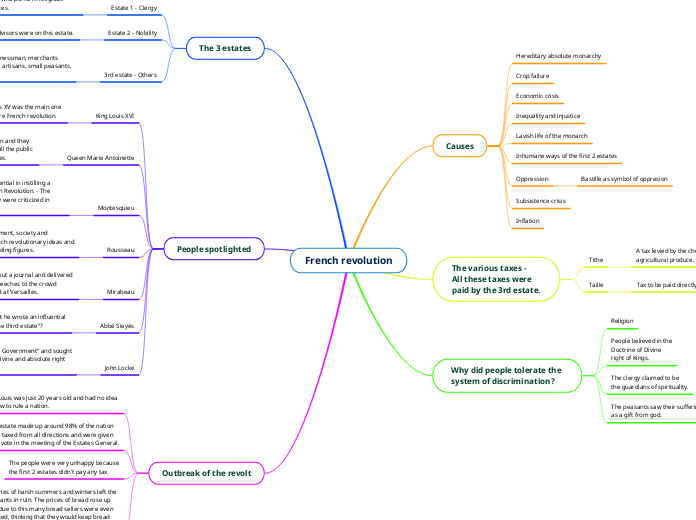French revolution
Causes
Hereditary absolute monarchy
Crop failure
Economic crisis
Inequality and injustice
Lavish life of the monarch
Inhumane ways of the first 2 estates
Oppression
Bastille as symbol of oppresion
Subsistence crisis
Inflation
The various taxes -
All these taxes were
paid by the 3rd estate.
Tithe
A tax levied by the church comprising one-tents of the
agricultural produce.
Taille
Tax to be paid directly to the state.
Why did people tolerate the
system of discrimination?
Religion
People believed in the
Doctrine of Divine
right of Kings.
The clergy claimed to be
the guardians of spirituality.
The peasants saw their sufferings
as a gift from god.
The 3 estates
Estate 1 - Clergy
Clergy are the leaders of a religion who perform religious services and teach religious practices.
Estate 2 - Nobility
The kings their families and advisors were on this estate.
3rd estate - Others
This estate comprises of big businessman, merchants
court officials, lawyers, peasants, artisans, small peasants,
landless labours, servants.
People spotlighted
King Louis XVI
He along with King Louis XV was the main one
responsible for the entire French revolution.
Queen Marie Antoinette
She was King Louis XVI queen and they
led a lavish life. They spent all the public
money for their personal uses.
Montesquieu
His job, The Spirit of the Laws, was influential in instilling a desire for liberty and sparked the French Revolution. - The feudalistic foundations of French society were criticized in Montesquieu's writings.
Rousseau
His writings and ideas about government, society and individual liberties underpinned French revolutionary ideas and inspired some of the revolution’s leading figures.
Mirabeau
He bought out a journal and delivered
powerful speeches to the crowd
assembeled at Versailles.
Abbé Sieyès
He was generally a priest but he wrote an influential
pamphlet called - "What is the third estate"?
John Locke
He wrote "The two treaties of Government" and sought
to refute the doctrine of the divine and absolute right
of the monarch.
Outbreak of the revolt
King Louis was just 20 years old and had no idea
on how to rule a nation.
The 3rd estate made up around 98% of the nation
but were taxed from all directions and were given
only one vote in the meeting of the Estates General.
The people were very unhappy because
the first 2 estates didn't pay any tax.
A series of harsh summers and winters left the
peasants in ruin. The prices of bread rose up
and due to this many bread sellers were even
hanged, thinking that they would keep bread
for themselves. This lead to a big ruin in France.
